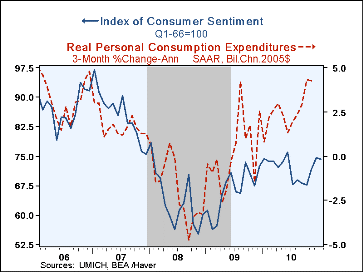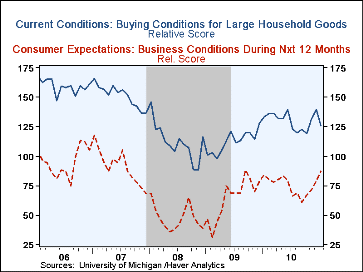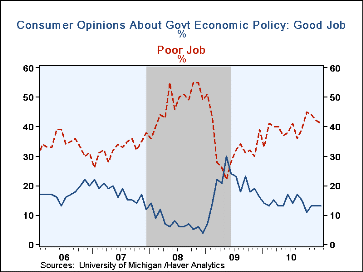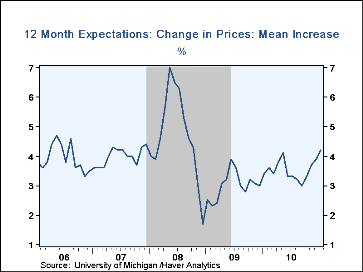 Global| Jan 28 2011
Global| Jan 28 2011Consumer Sentiment Regains Some Spirit
by:Tom Moeller
|in:Economy in Brief
Summary
Consumer sentiment bounced back late this month from some mid-month apprehension. As a result, the full-month reading just slipped from December. The January reading of consumer sentiment from the University of Michigan dipped just [...]
Consumer sentiment bounced back late this month from some mid-month apprehension. As a result, the full-month reading just slipped from December. The January reading of consumer sentiment from the University of Michigan dipped just modestly to 74.2 following gains during the prior two months. Nevertheless, the figure remained near its highest since June. The January reading was better than Consensus expectations for 73.3. During the last ten years there has been a 60% correlation between the level of sentiment and the three-month growth in real consumer spending.
The January reading of current economic conditions fell 4.1% to its lowest since October. The reading of current personal finances bounced back from early-month gloom and improved 6.3% to its highest since April 2008. The reading of buying conditions for large household goods, like appliances and furniture, slipped. The expectations component of consumer sentiment remained firm and rose 2.7% to its highest since June. Holiday spending was done against the backdrop of lower expectations of personal finances over the next year. However, the reading of business conditions during the next twelve months surged 10.1% to its highest since September 2009. Expectations for conditions during the next five years rose moderately m/m.
Expected price inflation during the next year increased further to 4.2%. As oil prices strengthened the latest reading was the highest since October 2008. Respondents' view of government policy, which may eventually influence economic expectations, improved sharply from the mid-month reading to end the full-month up slightly from December. A stable 13 percent of respondents thought that a good job was being done by government while a lessened 41% thought a poor job was being done, still nearly the most since January 2009.
The Reuters/University of Michigan survey data are not seasonally adjusted. The readings are based on telephone interviews with just over 300 households during early-to-mid November. The summary indexes are in Haver's USECON database with details in the proprietary UMSCA database.
Consumers And The Economy, Part II: Household Debt and the Weak U.S. Recovery from the Federal Reserve Bank of San Francisco is available here
| University of Michigan (Q1'66 = 100) | Jan | Mid Jan |
Dec | Nov | Jan Y/Y |
2010 | 2009 | 2008 |
|---|---|---|---|---|---|---|---|---|
| Consumer Sentiment | 74.2 | 72.7 | 74.5 | 71.6 | -0.3% | 71.8 | 66.3 | 63.8 |
| Current Economic Conditions | 81.8 | 79.8 | 85.3 | 82.1 | 0.9 | 81.0 | 69.6 | 73.7 |
| Personal Finances | 85 | 77 | 80 | 81 | 10.4 | 79 | 67 | 78 |
| Buying Conditions For Large Household Goods | 126 | 129 | 140 | 131 | -5.3 | 130 | 112 | 112 |
| Expectations | 69.3 | 68.2 | 67.5 | 64.8 | -1.1 | 65.9 | 64.1 | 57.3 |
| Expected Change In Personal Finances | 110 | 107 | 112 | 109 | 0.0 | 110 | 113 | 107 |
| Business Conditions Next 12 Months | 87 | 87 | 79 | 71 | 3.6 | 75 | 65 | 48 |
| Business Conditions Next 5 Years | 80 | 78 | 78 | 78 | -7.0 | 79 | 78 | 73 |
Tom Moeller
AuthorMore in Author Profile »Prior to joining Haver Analytics in 2000, Mr. Moeller worked as the Economist at Chancellor Capital Management from 1985 to 1999. There, he developed comprehensive economic forecasts and interpreted economic data for equity and fixed income portfolio managers. Also at Chancellor, Mr. Moeller worked as an equity analyst and was responsible for researching and rating companies in the economically sensitive automobile and housing industries for investment in Chancellor’s equity portfolio. Prior to joining Chancellor, Mr. Moeller was an Economist at Citibank from 1979 to 1984. He also analyzed pricing behavior in the metals industry for the Council on Wage and Price Stability in Washington, D.C. In 1999, Mr. Moeller received the award for most accurate forecast from the Forecasters' Club of New York. From 1990 to 1992 he was President of the New York Association for Business Economists. Mr. Moeller earned an M.B.A. in Finance from Fordham University, where he graduated in 1987. He holds a Bachelor of Arts in Economics from George Washington University.
More Economy in Brief
 Global| Feb 05 2026
Global| Feb 05 2026Charts of the Week: Balanced Policy, Resilient Data and AI Narratives
by:Andrew Cates










